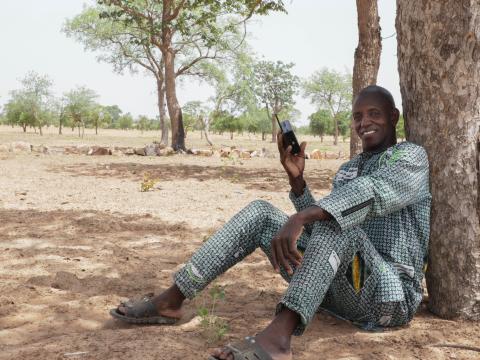World Vision and CTA are Pulling Rural Farming into the 21st Century

The year is 2005 and Siratigui, a farmer in Beledougou has noticed a change in the regular seasons. “I have been farming since 1982 but in 2005 something changed,” explained Siratigui. Before 2005, the father of 15 was yielding about 500kg of sorghum and millet per hectare on the 52-hectare farm he owns with his brother. Production began to stall and dip in some years. Things were changing and Siratigui needed to ensure he could feed and support his family with the only thing he knew how to do.
"Before there used to be climate variations but they were never too bad,” Siratigui said of the profound change in climate conditions, “but now it was critical."
Before there used to be climate variations but they were never too bad, but now it was critical.
In 2014, Siratigui enrolled in World Vision Mali’s Eco-Agriculture in the Sahel Project. There, he learned improved farming techniques based on the Farmer Managed Natural Regeneration (FMNR) approach, such as planting diversity, the cessation of burning and natural shrubbery to feed the soil. Before he knew it, Siratigui and his brother doubled their output of millet and sorghum to one ton per hectare and added maize to their stable of plants, yielding 3.5 tons per hectare.

Through the practice of FMNR, Siratigui staved off the worst effects of climate change on his production but the irregular climate patterns endured. “The greatest challenge was not knowing when the rains would come in sufficient quantities to plant. We did not have an understanding of the seasonal cycles. We used to rely on ancient methods of reading the stars and checking the hardness (moisture level) of the soil,” Siratigui recounted. These practices helped but they were not sustainable with the increasingly arbitrary weather patterns.
World Vision and Technical Center for Agricultural Cooperation (CTA) launched their joint project, Accelerating the Uptake of Climate Smart Agriculture in Mali (UPCSA), in 2018. The project provides farmers with the critical meteorological information they need to make decisions on their planting patterns and the knowledge of how to maximize weather conditions. This information is provided through technology available to farmers in rural communities such as radio transmissions, text messages, etc.
The weather information I get guides me in all I do now.....I can't work without this information anymore.
“In 2018, the new project provided the village and me with a pluviometer so even without the messages via radio and text, we are always well informed of when the rains are coming,” Siratigui grinningly said. "The weather information I get guides me in all I do now; when to start planting, what to plant and how to plant it. I can't work without this information anymore."
Paired with the advents of the Eco-Agriculture in the Sahel Project, UPCSA give farmers all the requisite tools they need to maximize their production to combat climate, feed their families, enrich their communities and ensure life in its fullness for their children.
Learn more about this project and World Vision's work with Partners in Mali.